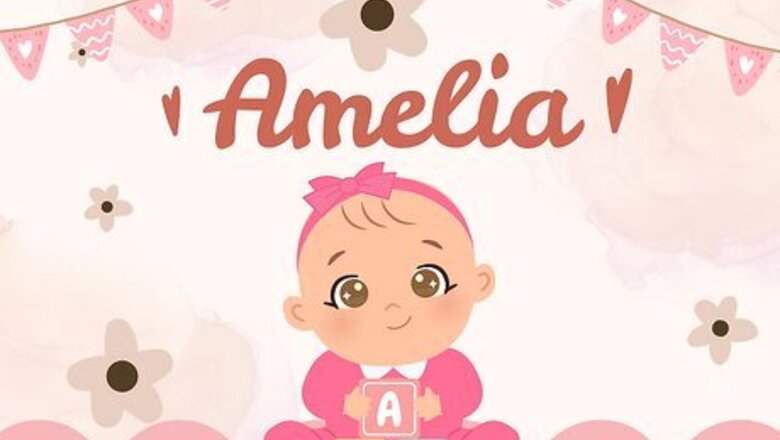
views
Common Victorian Baby Girl Names
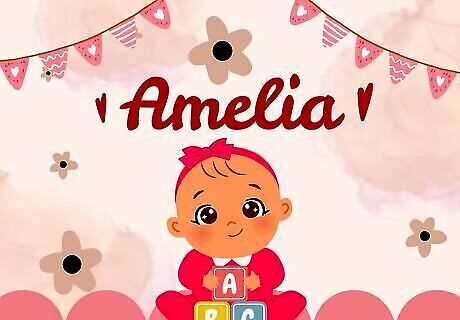
Amelia Means “work,” “industrious,” or “striving.” Taken from the Germanic “amal,” meaning “hardworking.” Origin: German Alternative Spellings and Variations: Amalia, Amelie, Amélie, Emelia, and Emilia.
Beatrice Means “bringer of joy” and “blessings” in Latin. It’s taken from the Latin Beatrix, meaning “she who brings happiness.” Origin: Latin Alternative Spellings and Variations: Beata, Béatrice, Beatriz, Beate, Bea, and Trixie.
Elizabeth Means “God is my oath” and “God is my abundance.” Origin: Hebrew Alternative Spellings and Variations: Eliza, Lizzie, and Beth.
Evelyn Means “wished for or desired”; It’s an English variation of the French Aveline that can also mean “island.” Origin: English, French Alternative Spellings and Variations: Evelynn, Evaline, Evelina, Aveline, Evie, Eve, and Lynn.
Florence Means “flower or flourishing from the Latin “florens,” meaning “to bloom.” Origin: Latin Alternative Spellings and Variations: Florrie, Flo, and Flossie.
Hannah Means “favor” or “grace” as the name of the mother of the prophet Samuel in the Bible. Origin: Hebrew Alternative Spellings and Variations: Hanna, Hana, Hanah, and Chana.
Hazel Means “the hazel tree” or “light brown.” It relates to the Old English “hsel,” referring to the hazelnut tree. Origin: English Alternative Spellings and Variations: Hazell, Hazelle, Hasel, and Heizle.
Lillian Means “flower” and refers to the “lily” in German; derived from the Latin “lilium.” Origin: German Alternative Spellings and Variations: Lilian, Lilliann, Lilliana, and Lilliane.
Victoria Means “victory” and is inspired by Queen Victoria, the namesake for the Victorian era. Origin: Latin Alternative Spellings and Variations: Vicky, Tori, Vic, and Ria.
Violet Means “purple” or “violet flower.” It’s taken from the Latin “viola,” meaning “flower,” and ranked 20th for U.S. girls in 2022. Origin: Latin Alternative Spellings and Variations: Viola, Violetta, Violette, and Violeta.
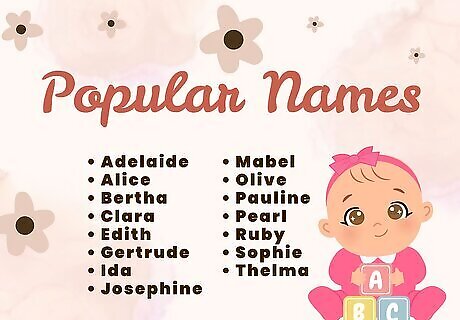
Other Popular Victorian Baby Girl Names Find additional Victorian girl names below that have resurfaced in popularity in recent years: Adelaide: Means “nobility” and “adornment.” Alice: Means “noble.” Bertha: Means “bright” or “famous.” Clara: Means “bright” and “clear.” Edith: Means “riches” or “blessed.” Gertrude: Means “strength of the spear.” Ida: Means “hardworking” and “prosperous.” Josephine: Means “God will increase.” Mabel: Means “lovable.” Olive: Means “olive tree.” Pauline: Means “little.” Pearl: Means “pearl” for the gemstone. Ruby: Means “red.” Sophie: Means “wisdom.” Thelma: Means “will” or “volition.”
Pretty Victorian Baby Girl Names
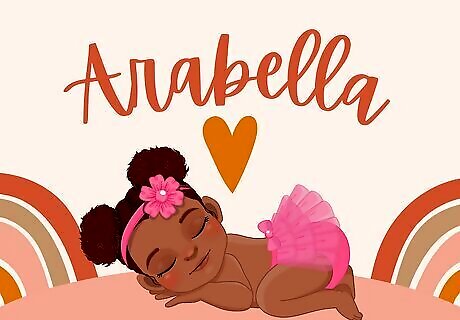
Arabella Means “answered prayer” or “beautiful”; it can also mean “beautiful lion” or “prayerful.” Origin: English, Latin Alternative Spellings and Variations: Aribel, Aribella, Aribelle, Bela, and Bella.
Beryl Means “light green gemstone”; it’s taken from the Greek “beryllos,” referring to blue-green gemstones. Origin: Greek Alternative Spellings and Variations: Berrill
Charlotte Means “free man (or woman)” as the feminine variation of the French Charles; originally from the Germanic “caral.” Origin: French, German Alternative Spellings and Variations: Charlie, Lottie, Lotte, Carlota, and Carlotta.
Clementine Means “gentle” or “merciful”; the French feminine form of Clement, meaning “mild.” Origin: French, Latin Alternative Spellings and Variations: Clementina, Clémence.
Dahlia means “Dahl’s flower” or “valley flower”; It is associated with the dahlia flower, named after the Swedish botanist Anders Dahl. Origin: Swedish Alternative Spellings and Variations: Dalia
Dorothea Means “gift of God”; composed of the Greek “doron,” meaning “gift,” and “theos,” meaning “God.” Origin: Greek Alternative Spellings and Variations: Dorothy, Dorothée, and Dorotea.
Eloise Means “famous warrior” or “healthy”; Taken from the Old German Helewidis, meaning "healthy" and "wide.” Origin: French, German Alternative Spellings and Variations: Heloísa, Eloisa.
Isabella Means “the beautiful one”; It’s taken from the Hebrew Elisheba, meaning “devoted to God.” Origin: Spanish, Italian Alternative Spellings and Variations: Izabella, Isabelle, Isabel, and Isobel.
Matilda Means “strong battle maiden”; it also means “mighty in battle”; from the Old High German "maht," meaning “might” or “strength” and "hild," meaning “battle.” Origin: German Alternative Spellings and Variations: Mathilde, Matilde.
Theodora Means “gift of God”; It’s the feminine variation of Theodore, meaning “divine gift.” Origin: Greek Alternative Spellings and Variations: Mathilde, Matilde.
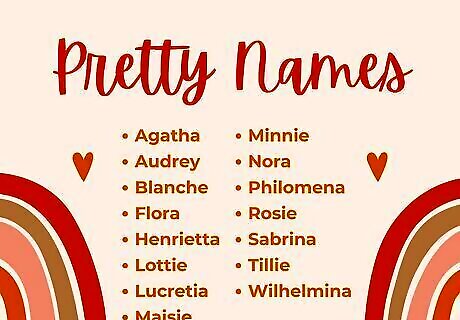
Other Pretty Victorian Baby Girl Names Here are some more pretty Victorian names for girls that include a mix of formal and casual names: Agatha: Means “good” or “virtuous.” Audrey: Means “noble strength.” Blanche: Means “white.” Flora: Means “flower.” Henrietta: Means “estate ruler.” Lottie: Means “free man.” Lucretia: Means “profit” or “wealth.” Maisie: Means “pearl” or “child of light.” Minnie: Means “wished-for” or “rebellion.” Nora: Means “light.” Philomena: Means “lover of strength.” Rosie: Means “rose.” Sabrina: Means “patience.” Tillie: Means “mighty in battle.” Wilhelmina: Means “resolute protector.”
Elegant Victorian Baby Girl Names
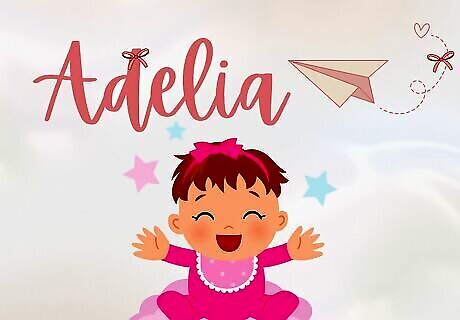
Adelia Means “nobility” or “adornment.” It’s from the Old German “adal,” meaning “noble” and “heid,” meaning “kind” or “type.” Origin: German Alternative Spellings and Variations: Adele, Adeline, Adelina, Adalia.
Alexandra Means “defending man”; It also means “protector of mankind”; made up of the Greek "alexein,” meaning “to defend,” and "anēr,” meaning “man.” Origin: Greek Alternative Spellings and Variations: Alessandra, Alexa, Alexis, and Alexia.
Augusta Means “noble” and “majestic”; It’s associated with female members of royalty as the form of the Latin title Augustus. Origin: Latin Alternative Spellings and Variations: None
Cordelia Means “heart” or “daughter of the sea.” It’s the name of King Lear’s daughter in the Shakespearean play of the same name. Origin: Latin, Celtic Alternative Spellings and Variations: Cordeilla, Cordélia, Cordell, and Cordill.
Eleanor Means “lighthearted”; It’s an English variation of the French Alienor; it also means “shining light.” Origin: French, Greek Alternative Spellings and Variations: Eleanore, Eleanora, Elinore, Elinor, Elanor, and Elenora.
Helena Means “light” or “shining”; it comes from the Greek “helios,” meaning “light.” Origin: Greek Alternative Spellings and Variations: Helen, Helene, Elena, and Elen.
Octavia Means “eight”; it’s the female form of the Latin Octavius which is often given to the “8th child.” Origin: Latin Alternative Spellings and Variations: Ottavia
Phoebe Means “bright,” “radiant,” or “pure.” It’s associated with the Titan goddess of the moon and prophecy. Origin: Greek Alternative Spellings and Variations: Phebe, Phebe, Pheby, and Phobe.
Rebecca Means “to tie” or “bind”; based on the Hebrew Rivkah, from “ribbqah,” meaning “join, “tie,” or “snare.” Origin: Hebrew Alternative Spellings and Variations: Becca, Becky, Rebeca, Rébecca, Rebeka, and Rebekah.
Sylvia Means “wood spirit” or “wood nymph.” It’s derived from the Latin “silva,” meaning “forest.” Sylvia is named after Sylvanus, the Roman god of the woods. Origin: Latin Alternative Spellings and Variations:
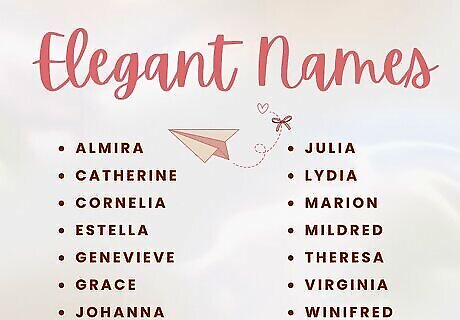
Other Elegant Victorian Baby Girl Names Keep reading for more sophisticated Victorian girl names to consider: Almira: Means “princess” or “leader.” Catherine: Means “pure.” Cornelia: Means “horn.” Estella: Means “star.” Genevieve: Means “woman of the people.” Grace: Means “God is gracious.” Johanna: Means “God is gracious.” Julia: Means “youthful.” Lydia: Means “beautiful.” Marion: Means “star of the sea.” Mildred: Means “gentle counselor.” Theresa: Means “to harvest” or “late summer.” Virginia: Means “virginal” or “maidenly.” Winifred: Means “resolute protector.”
Unique Victorian Baby Girl Names
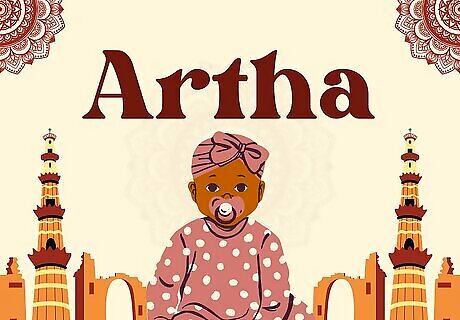
Artha Means “riches” or “wealth”; It’s linked to Lakshmi, the Hindu goddess of wealth and good fortune. Origin: Indian Alternative Spellings and Variations: Martha, Bartha, and Eartha.
Comfort Means “ease” and “relaxation”; taken from the Latin "confortare," meaning "to strengthen.” Origin: English, Latin Alternative Spellings and Variations: Consolata, Nechama, and Consuelo.
Deliverance Means “liberation” or “being set free”; a Puritan name that is associated with being cleansed from evil spirits. Origin: English Alternative Spellings and Variations: None
Hazeltine Means “valley where hazels grow.” It was originally a surname given to someone living in a valley where hazel trees grew. Origin: English Alternative Spellings and Variations: Haseltine, Hazletine.
Imelda Means “universal battle” or “warrior”; It’s derived from the German Irmhilde, made up of "irmin,” meaning “whole” and "hilt,” meaning “battle.” Origin: German, Italian Alternative Spellings and Variations: Immy, Mel, Melda, and Ilda.
Laverne Mean “the Alder tree” or “of spring.” It’s associated with Laverna, the Roman goddess of thieves, cheats, and the underworld. Origin: Latin Alternative Spellings and Variations: LaVern, LaVerne, and Laverna.
Marialice Means “beloved” and “noble” and is a compound name made up of Mary, meaning “wished-for child” and Alice, meaning “kind.” Origin: Hebrew Alternative Spellings and Variations: Maryalice, Marialisa, or Marialice.
Pardon Means “forgiveness”; taken from the Old French “pardoun,” meaning “forgiven of wrongdoing.” Origin: English, French Alternative Spellings and Variations: None
Temperance Means “moderation” or “self-control”; a virtue name linked with the concept of balance or restraint. It’s also used by Puritan families. Origin: English Alternative Spellings and Variations: Tempe, Emerence.
Zilpha Means “frailty” or “delicateness”; it’s from the Hebrew “zalaph,” meaning “to drip or sprinkle” and refers to the handmaid of Leah in the Old Testament. Origin: Hebrew Alternative Spellings and Variations: Zilphia, Zilpah.
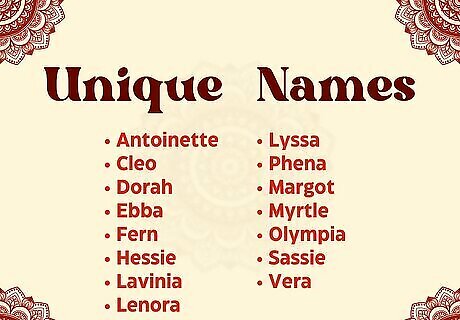
Other Unique Victorian Girl Names These additional unique Victorian girl names stand out as variations of more traditional names or particular versions of names that have been around for a very long time: Antoinette: Means “highly praiseworthy.” Cleo: Means “to praise.” Dorah: Means “gift of God.” Ebba: Means “strong.” Fern: Means “fern plant.” Hessie: Means “battle” or “war.” Lavinia: Means “legendary mother of the Roman people.” Lenora: Means “light.” Lyssa: Means “rage” and “fury.” Phena: Means “foam” or “froth.” Margot: Means “child of light.” Myrtle: Means “green shrub” Olympia: Means “from Mount Olympus.” Sassie: Means “bold and spirited.” Vera: Means “truth.”
Victorian Gothic Girl Names
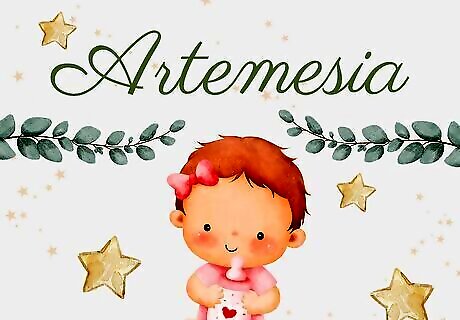
Artemesia Means “of Artemis” or “safe.” It’s associated with Artemis, the Greek goddess of the moon. Origin: Greek Alternative Spellings and Variations: Artemisia, Artemia.
Briar Means “thorny bush”; it’s used to describe wild roses or brambles; the name of the “Briar Rose” Grimm's fairytale. Origin: English Alternative Spellings and Variations: Brier, Brie.
Dulcema Means “sweet”; it’s a Latin variation of Dulce, meaning “sweet,” and the Spanish word for candy. Origin: Latin Alternative Spellings and Variations: Dulcie, Dulciana.
Farewell Means “prosper” and is taken from the Middle English “fare wel,” meaning “do well”; associated with the salutation “farewell” or “goodbye.” Origin: English Alternative Spellings and Variations: None.
Iphigenia Means “strong-born” and is the name of the daughter of Agamemnon and Clytemnestra in Greek mythology. Origin: Greek Alternative Spellings and Variations: Iphigenie, Ifigenia, and Philena
Leocadia Means “bright,” “clear,” and “pure.” It derives from the Latin "leucius" and the Greek "leukós”; associated with Saint Leocadia, a Spanish martyr. Origin: Latin, Greek Alternative Spellings and Variations: Leokadia, Léocadie.
Opal Means “precious stone” or “jewel”; taken from the Sanskrit “upala,” meaning “jewel.” Origin: Sanskrit Alternative Spellings and Variations: None.
Ophelia Means “help” or “benefit”; The name of the tragic heroine in Shakespeare’s Hamlet. Origin: Greek Alternative Spellings and Variations:
Rowena Means “famous friend” and “joy”; derived from the Germanic “hrod,” meaning “fame” and “wynn,” meaning “joy.” Origin: German, Welsh Alternative Spellings and Variations: Ronwen, Renwein, and Romwenna.
Ursula Means “little bear” or “bear cub.” It’s made up of the Latin "ursa," meaning “bear” and a diminutive suffix, referring to a female bear cub. Origin: Latin Alternative Spellings and Variations: Ursala, Ulla, Ursel, and Urška.
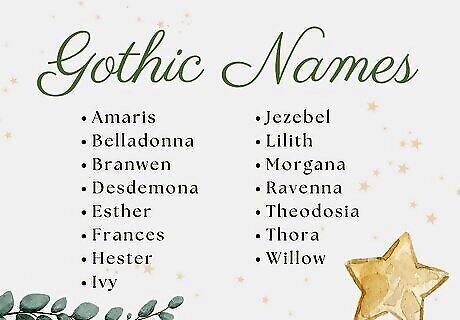
Other Gothic Victorian Baby Girl Names Enjoy more gothic Victorian names that are known for their dark, bold quality ahead. They include biblical-inspired names, along with nature-inspired ones like Thora and Willow: Amaris: Means “promised by God.” Belladonna: Means “beautiful lady.” Branwen: Means “white raven.” Desdemona: Means “ill-fated.” Esther: Means “star.” Frances: Means “Frenchman” or “free man.” Hester: Means “star.” Ivy: Means “vigor” and “energy.” Jezebel: Means “Baal exalts.” Lilith: Means “belonging to the night.” Morgana: Means “born of the sea.” Ravenna: Means “Italian city.” Theodosia: Means “God-given.” Thora: Means “thunder.” Willow: Means “willow tree.”
Vintage Victorian Baby Girl Names
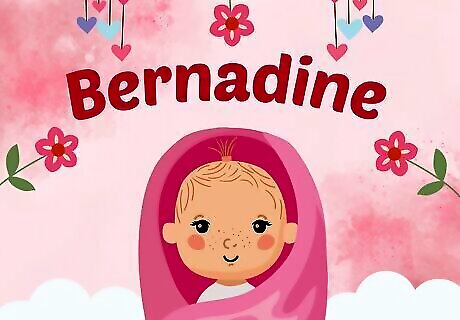
Bernadine Means “brave bear” or “strong as a bear.” It’s the French female form of Bernard. Origin: French Alternative Spellings and Variations: Bernadette, Berdine.
Corrine Means “beautiful maiden.” It’s an alternative to the Greek Korinna, made up of "korē" meaning "maiden.” Origin: French, Greek Alternative Spellings and Variations: Corrine, Corin, Corine, Corinn, Coryn, and Corryn.
Emmeline Means “vigorous” and “brave”; it’s a French variation of the Germanic Emily, meaning “rival.” Origin: French, German Alternative Spellings and Variations: Emiline, Emmilene, Emmaline, and Ameline.
Ethel Means “noble”; it’s a short form of the Old English Etheldreda that first appeared in the 1840s. Origin: Old English Alternative Spellings and Variations: Edith, Ettie.
Harriet Means “ruler of the home”; it’s taken from the Germanic "heim,” meaning “home” and "ric,” meaning “power” or “ruler.” Origin: German Alternative Spellings and Variations: Harriett, Hariett, Harrietta, and Henrietta.
Jenny Means “fair one”; it’s a diminutive of Jennifer, originally based on Guinevere, meaning “white wave.” Origin: English, French Alternative Spellings and Variations: Jennifer, Genevieve, and Jenna.
Louisa Means “famous warrior” or “renowned warrior”; it’s the feminine variation of the French Louis. Origin: French, German Alternative Spellings and Variations: Louise, Luisa, and Luiza.
Maggie Means “sweet girl”; It’s also a short form of Margaret, meaning “pearl” in Greek. Origin: Scottish Alternative Spellings and Variations: Magdalena, Magnolia, and Marigold.
Martha Means “lady” or “mistress of the house”; the name of Mary and Lazarus’ sister in the Bible. Origin: Aramaic Alternative Spellings and Variations: Marta, Marthe, and Marfa.
Ruth Means “friend” or “friendship”; it also means “lady companion”; taken from the Hebrew "re'ut," meaning “friend.” Origin: Hebrew Alternative Spellings and Variations: Ruthie, Ruthanne, Reut, Rut, and Rhout.
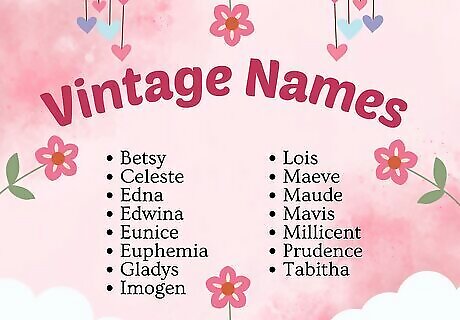
Other Vintage Victorian Baby Girl Names You can check out more old-fashioned Victorian girl names here, many of which are coming back in style for baby girls: Betsy: Means “worshipper of God.” Celeste: Means “heavenly.” Edna: Means “pleasure” or “delight.” Edwina: Means “rich friend.” Eunice: Means “good victory.” Euphemia: Means “good speaker” and “well-born.” Gladys: Means “princess.” Imogen: Means “maiden.” Lois: Means “superior” or “most beautiful.” Maeve: Means “intoxicating.” Maude: Means “mighty in battle.” Mavis: Means “songbird.” Millicent: Means “industrious.” Prudence: Means “foresight” or “intelligence.” Tabitha: Means “gazelle.”
Unusual Victorian Baby Girl Names
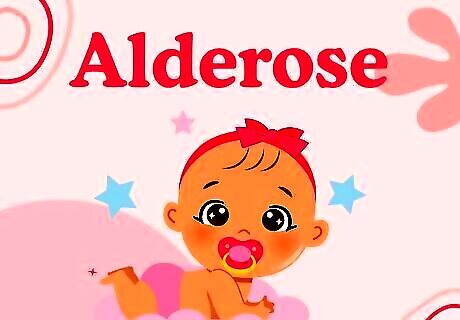
Alderose Means “old rose”; Taken from the Old English “ald,” meaning “old” or “wise,” and “rose,” named for the flower. Origin: English Alternative Spellings and Variations: Aldarosa, Aldarose, Aldrosie.
Alethia Means “truth” and is taken from the Greek "alḗtheia,” means "truth,” the personification of truth in Greek mythology. Origin: Greek Alternative Spellings and Variations: Aletheia, Alithia.
Bellamira Means “wondrous beauty” or “beautiful sight”; it’s a compound name composed of the Latin “bella,” meaning “beautiful,” and “mira,” meaning “wondrous” or “marvelous. Origin: Latin Alternative Spellings and Variations: Bella
Hesperance Means “hope” and “expectation”; it’s linked to the Latin “vesper,” meaning “evening star” or “evening prayer.” Origin: French Alternative Spellings and Variations: Esperance
Minerva Means “intellect,” “wisdom,” or “mind.” It’s the name of the Roman goddess of wisdom who is also associated with warfare. Origin: Latin Alternative Spellings and Variations: Minnie
Petronia Means “stone”; it’s taken from the Greek “petros,” meaning “rock.” Origin: Greek Alternative Spellings and Variations: Petronella, Petronille, Petronija, and Petronila.
Rosetta Means “little rose” and is associated with the Rosetta Stone, which helped translate Egyptian hieroglyphs. Origin: Italian Alternative Spellings and Variations: Rosalie, Rosita, and Rosanna.
Sophronia Means “wise” or “self-controlled”; it’s taken from the Greek “sophron,” meaning “wise” or “sensible.” Origin: Greek Alternative Spellings and Variations: Sofronia, Saphronia, and Sophrona.
Vesperina Means “evening star”; it’s taken from the Latin “vesper,” meaning “evening” or “evening star” and refers to the planet Venus being visible at sunset. Origin: Latin Alternative Spellings and Variations: Vespera, Vesper.
Wren Means “brown songbird”; it derives from the Old English "wrænna,” referring to the Wren bird, associated with poets and songwriters. Origin: English Alternative Spellings and Variations: None
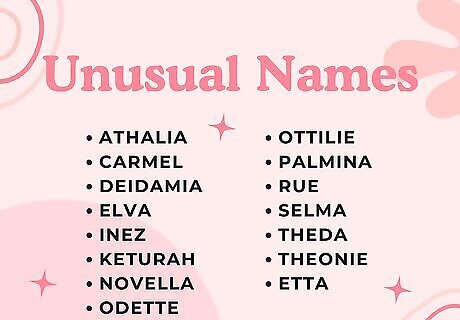
Other Unusual Victorian Baby Girl Names Embrace the most unusual Victorian girl names by reading on for more below. Some of these are based in Spanish, Latin, or French, so they appear differently than similar counterparts: Athalia: Means “God is exalted.” Carmel: Means “garden” or “orchard.” Deidamia: Means “unconquerable.” Elva: Means “white” or “bright.” Inez: Means “pure” or “chaste.” Keturah: Means “incense” or “fragrance.” Novella: Means “new” or “young.” Odette: Means “wealthy.” Ottilie: Means “prosperity.” Palmina: Means “palm tree.” Rue: Means “regret.” Selma: Means “God’s helmet.” Theda: Means “people” or “gift from God.” Theonie: Means “godly” or “divine.” Etta: Means “estate ruler.”
Rare Victorian Baby Girl Names
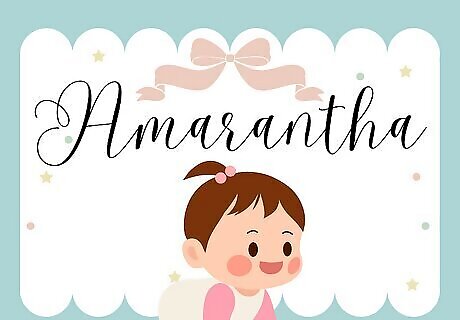
Amarantha Means “unfading” or “immortal”; it refers to the amaranth flower that is associated with beauty and grace. Origin: Greek Alternative Spellings and Variations: Amaranta, Amaranth.
Bathsheba Means “daughter of the oath”; it refers to the wife of King David and the mother of King Solomon in the Bible. Origin: Hebrew Alternative Spellings and Variations: Bath-shua, Batsheva, and Bethsheba.
Erskine Means “high cliff” or “verdant hill”; it’s named after the town of Erskine in Renfrewshire, England. Origin: Scottish Alternative Spellings and Variations: Erskin, Irskine, and Ersken.
Flossie Means “flourishing” or “prosperous” as a nickname for Florence, meaning “flourishing.” Origin: English, Latin Alternative Spellings and Variations: Flo, Florrie, Flossy, and Lassie.
Hedley Means “heathered meadow”; it’s derived from the Old English"hæg,” meaning “hedge” and "leah," meaning “meadow.” Origin: English Alternative Spellings and Variations: Hadley
Jemima Means “dove” as the name of one of Job’s 3 daughters in the Bible. It can also mean “lady daylight.” Origin: Hebrew Alternative Spellings and Variations: Jemimah, Mima.
Lupin Means “wolf-like”; it comes from the Latin “lupinus,” meaning “pertaining to the wolf.” Origin: Latin Alternative Spellings and Variations: Lupina
Perpetua Means “continuous” or “forever”; it’s linked to the Christian Saint Perpetua, who is associated with eternity. Origin: Latin Alternative Spellings and Variations: Pippa, Petra.
Rosamunde Means “horse protector”; it also means “pure rose” or “rose of the world” in Latin. Origin: German, Latin Alternative Spellings and Variations: Rosamund, Rosamonde.
Zillah Means “shade” or “shadow”; in the Bible, Zillah is one of the wives of Lamech, a descendent of Cain. Origin: Hebrew Alternative Spellings and Variations: Zilla, Zila.
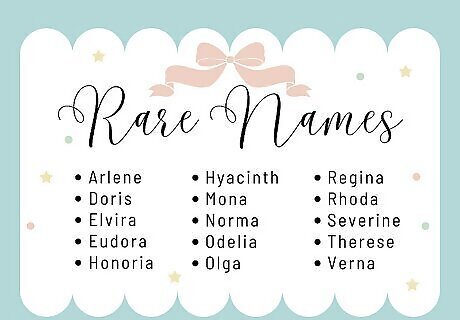
Other Rare Victorian Baby Girl Names The following Victorian baby girl names are the rarest and uncommon choices you can find for your little way. Arlene: Means “pledge” or “promise.” Doris: Means “gift of the sea.” Elvira: Means “truth.” Eudora: Means “good gift.” Honoria: Means “woman of honor.” Hyacinth: Means “hyacinth flower.” Mona: Means “noble.” Norma: Means “the standard” or “the norm.” Odelia: Means “I will praise God.” Olga: Means “holy.” Regina: Means “queen.” Rhoda: Means “rose.” Severine: Means “stern.” Therese: Means “harvester” or “late summer.” Verna: Means “spring green.”
Why choose old-fashioned girl names?
Old-fashioned girl names are unique and pretty, and they honor the past. They include beautiful names from the Victorian era (1837 to 1901) and are sometimes referred to as “old lady names.” Whatever you call them, these names often come back in style after members of the British royal family name their children after older generations of the family for posterity. For example, Lilibet Diana, the daughter of the Duke and Duchess of Sussex, is named after Queen Elizabeth’s nickname, along with Princess Diana’s first name. Many Victorian names are associated with nature. Specifically, British names derived from flowers, like Lily, Iris, Aster, Violet, and Flora, were very popular in the Victorian era.

















Comments
0 comment